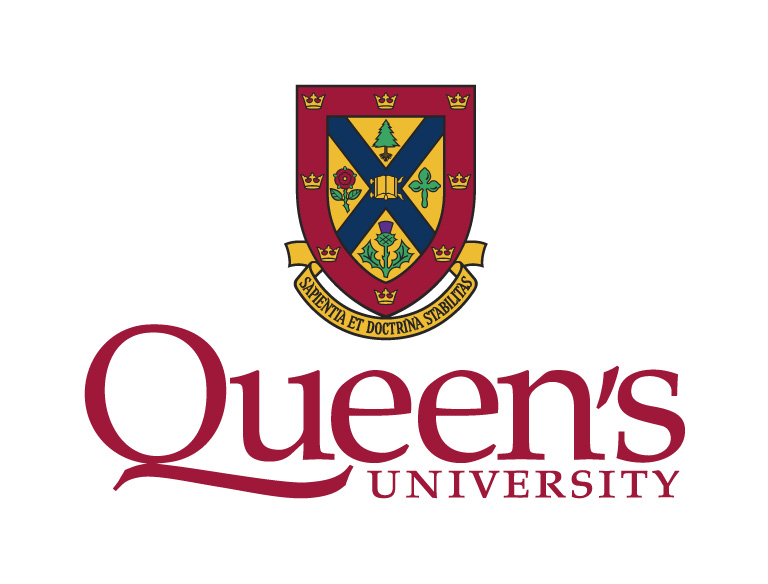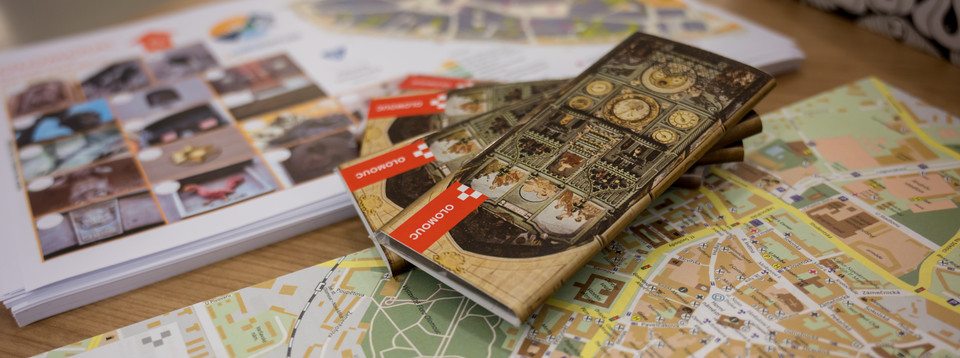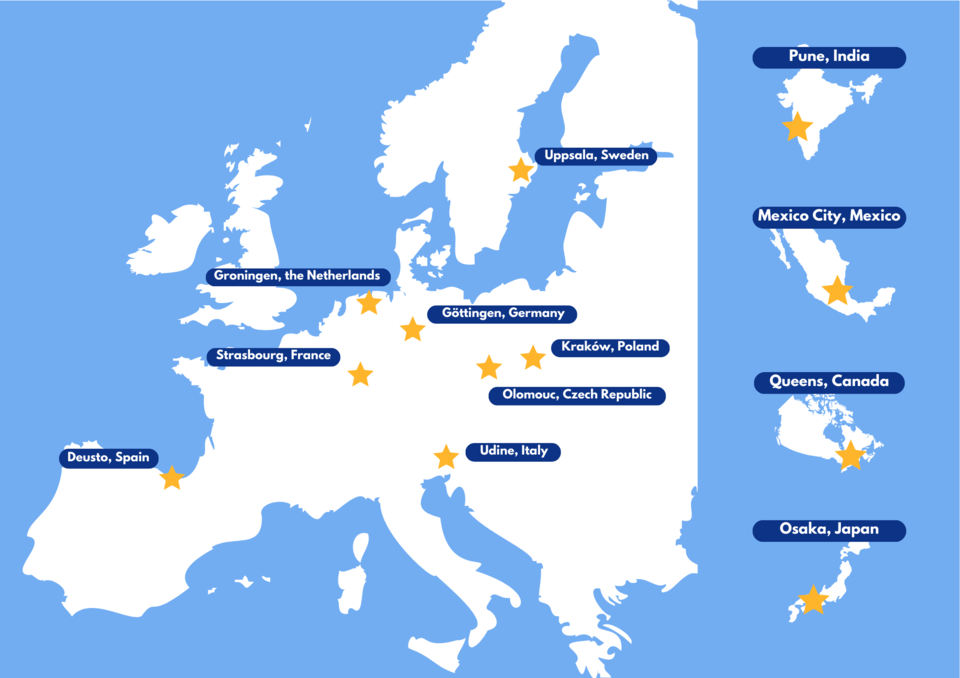Euroculture consortium consists of eight European and four non-European universities.
The European full partners are well spread over Europe. They all have different regional profiles and areas of specialisation.
Rijksuniversiteit Groningen, Netherlands
 www.rug.nl/masters/euroculture-em
www.rug.nl/masters/euroculture-em
The academic and research focus of the Euroculture programme at the University of Groningen centers on the notion of cultural identity and its relation to European integration in all its dimensions. The staff is trained in different disciplines: History, Cultural Studies, Law, Political Sciences, International Relations. Concepts such as “Europeanisation” and “Citizenship” are debated. Trans-Atlantic relations and Asia feature prominently in Groningen too.
Thesis topics cover a wide geographical area and a large variety of dimensions, as the topics are closely related to the interest and expertise of the students (European culture, history, politics, foreign relations, literature, arts, European law, religion, sociology). Necessarily, every thesis has an interdisciplinary character. Since the start of the exchange programme with the four Euroculture partner institutions outside Europe, it has become clearly noticeable that this experience has an important bearing on the choice of the thesis topics.
Georg-August-Universität Göttingen, Germany
 www.uni-goettingen.de/euroculture
www.uni-goettingen.de/euroculture
The Euroculture programme at the Georg-August-Universität Göttingen emphasises the allencompassing importance of culture in all spheres of human interaction. Due to its long-standing special cooperation with e.g. the University of Pune, the relations between the Near East / India and Europe form a special focus during the second semester. The postcolonial situation provides the basis for reflecting upon and challenging what has been established in the first semester.
The other regional focus would be on North America and the mutual influences between the regions, which are analysed in its political implications and cultural foundations. Concepts such as “Americanisation” and “Globalisation” are debated.
Special focus here as elsewhere lies on the investigation of “transcultural”, especially also with regard to migration flows to Europe as well as within Europe. Given the expertise of staff members in the field of Theology, the role of religions is analysed especially in its relationship between Christians and Muslims in the context of a continuing integration process within Europe and its neighbors. Experiences of second generation immigrants are being investigated with the help of generational theories. They also provide the link to collective memory and identity, which is one core theme of first semester coursework.
Uniwersytet Jagielloński w Krakowie, Poland
 www.euroculture.wsmip.uj.edu.pl
www.euroculture.wsmip.uj.edu.pl
The faculty at the Centre for European Studies is made up of internationally experienced instructors from various departments of the Jagiellonian University as well as visiting professors from other Polish universities and universities abroad. Three of them are full professors with rich international experience. Their goal is to provide graduate students with interdisciplinary knowledge, expertise and experience in European affairs, from the points of view both of the European institutions and Central and Eastern Europe societies. One of the research seminars focuses on the history, experiences and culture of Poland and its neighbours in Central Europe and to the East, in the countries of the former Soviet Union and its satellites. The second one focuses on the concept of identity, processes of social and cultural construction of identity on different levels, cultural diversity and pluralism, construction of civil society on local, regional, national and European level.
Universidad de Deusto Bilbao-San Sebastian, Spain
 euroculture.deusto.es
euroculture.deusto.es
The Faculty of Social Sciences and Humanities and the Institute of European Studies are made up of internationally experienced instructors and researchers from various departments of the University of Deusto. They have international experience and provide the students with multilingual and interdisciplinary knowledge on various fields regarding Europe and international relations.
The Euroculture programme at the University of Deusto gives special emphasis to Latin American relations with Europe, as Spain holds close cultural and political contacts with the region. Debate seminars at Deusto deal with concepts such as Human rights and immigration are central focuses and form a distinctive aspect at Deusto with regard to Euroculture. The University of Deusto has strong expertise on topics related to Central and South America. The specific objectives of the Europe in the wider World module offered at Deusto University are:
- To understand EU foreign policy.
- To understand the implications of EU’s international role for the wider world.
- To analyze critically EU foreign policy towards Latin America
- To be able to do critical analysis and evaluation of the EU’s foreign policy in Latin America.
- Thematic challenges of the strategic partnership
- EU–LAC summits
- Specialised dialogues: subregional and bilateral relations
Uppsala Universiteit, Sweden
 www.teol.uu.se/euroculture
www.teol.uu.se/euroculture
The Euroculture programme at the university of Uppsala is closely connected to the Department of History of Ideas and Sciences, the Faculty of Law, the Department of Government, the Department of Peace and Conflict Research, the Department of Modern Languages, and the Hugo Valentin Centre. The latter is an institution devoted to multiethnic studies and research on issues related to the Holocaust and genocide. In particular Uppsala focuses on aspects of the welfare state, gender politics, minority issues, migration, security regimes, communication patterns and life-styles. The regional focus in Uppsala lies on the Baltic Sea Region: this includes topics related to the environment, history, culture, economy, security and politics of the region.
Université de Strasbourg, Strasbourg, France
 sage.unistra.fr/en/formation/masters/master-euroculture
sage.unistra.fr/en/formation/masters/master-euroculture
Due to its location and the presence of all major institutions of European integration, the focus of Strasbourg university research in the Euroculture framework is placed on European cultural history and French-German border cooperation. Thematic topics such as cultural identity, political identity, regional policies, social studies, transborder cooperation are addressed in an interdisciplinary research group set up in 2008 focussing on “European cultural contacts”, integrated in the global framework of the research network Lilpa (Littératures, Langues, Paroles), which has received official recognition by the Ministere de l’Education under the denomination “EA 1339”. Associating mainly academic staff of the two Masters Programmes “Euroculture” and “Plurilinguisme européen et contacts de culture”, its discussions are held in both English and French. Meetings are open to students which are invited to present their master thesis, focussing on methodological issues.
Universita degli Studi di Udine, Italy
 www.uniud.it/euroculture
www.uniud.it/euroculture
The University of Udine was one of the founding partners of the Euroculture Master programme in 1999. Pooling together the expertises of academics from various Faculties (Modern Languages, Humanities, Economics and Law), the programme is naturally inclined to an interdisciplinary approach of teaching and research in the field of European cultural and political studies.
Due to its position at the crossroads of the Latin, Germanic and Slavic cultures and to the history of its territory, the programme in Udine has a regional focus on Central and Eastern Europe, the Balkans and the Mediterranean, while a strong attention is devoted to the issues of cultural identity, EU enlargement, regional policies and cross-border cooperation.
Queen´s University, Kingston, Canada
 https://www.queensu.ca/
https://www.queensu.ca/
University of Osaka, Japan
 www.osaka-u.ac.jp/en
www.osaka-u.ac.jp/en
Five course units are offered at Osaka University for students of Erasmus Mundus Master Program Euroculture. The lectures highlight modern aspects of Japanese culture, society, history, arts, literature and language from the perspective of interrelationship and mutual impact between Japan and Europe, the US, and Asia. Each class is organised in such a way that discussion is conducted bi-/multi-directionally.
UNAM (National Autonomous University of Mexico), Mexico City, Mexico
 www.cialc.unam.mx
www.cialc.unam.mx
Courses are taught in Spanish and/or English and have been especially designed for the third country partner cooperation with Euroculture. The courses are offered by CIALC: Research Centre for Latin American and Caribbean Studies at the National Autonomous Universityof Mexico (UNAM)
Some knowledge of Spanish language is required. UNAM applicants are recommended to enclose proof of Spanish language skills.
Two perspectives are used: the historic large impact of European culture on Latin American ways of life and on political, economic and social organisation in the region, and the present day understanding of Europe in Latin America. In the last 15 years of so there has been a specific European policy aimed at strengthening ties with Latin America. The development of EU-LAC summits, the fostering of educational student and scholars exchange, the increase European in trade and investment in the region are some of its most visible aspects. This, of course, has had an impact on Latin American societies, particularly those that in the XIXth and XXth centuries have had closer ties to European influence. On the other hand, the resentments due to a colonial past mark some attitudes towards Europe. A closer look is taken at attitudes, conceptualizations and policies of certain Latin American countries towards Europe in order to understand the possibilities of real interaction and cooperation between the two regions.
Savitribai Phule Pune University, India
 www.unipune.ac.in
www.unipune.ac.in
The Departments of Defence & Strategic Studies, Economics, English, Foreign Languages, History, Philosophy, Politics, Sociology, and the Centre for Interdisciplinary Studies form the Erasmus-Consortium at the University of Pune. It offers an academic program to the Erasmus students to explain the relation between India and Europe against the background of colonial history as well as in the light of socio-economic, political and strategic interrelationship today. The students have the opportunity to get familiar with Indian scholarship and culture with an emphasis on how Indians perceive and have perceived Europe.












